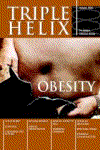Is religious belief bad for your health? Many Triple Helix readers may be interested in the answer to this question, and happily it is a question that can be answered from the results of a large volume of good research. The evidence for the effects of religious belief, or spirituality, upon health and disease is collected in this book. At over 700 pages and weighing 1.5kg, this volume will probably prove to be a classic.
The Handbook of Religion and Health is a superb example of American thoroughness and completeness. In presenting the evidence for the effect of religion on health, disease and recovery from illness, it reviews and discusses research that has examined the relationships between the patient's religious beliefs and a variety of mental and physical health conditions. It covers the whole of medicine and is based on 1,200 research studies and 400 reviews. These papers from the world literature are collected, summarised and assessed according to their scientific reliability and validity. The two biggest sections of the book, each ten chapters long, are Research on Religion and Mental Health and Research on Religion and Physical Disorders.
Does the patient's religious belief have any relevance for their health, prognosis and response to treatment? Is this true for both physical and mental illnesses? These are questions, amongst others, to which the Handbook of Religion and Health seeks to give answers. Psychiatry and mental health receive comprehensive cover and the authors have been fair-minded, including all relevant studies whether the result are positive or negative.
Under Research and Mental Health are discussed: religion and well-being, depression, suicide, anxiety disorders, schizophrenia and other psychoses, alcohol and drug use, delinquency, marital instability, personality, and a summarising chapter on understanding religion's effects upon mental health. The authors are extremely cautious in drawing conclusions but the results are overwhelming. If the factor being studied were something less emotive than faith and religion, the media would have taken these findings up as front-page news. To quote: 'In the majority of studies, religious involvement is correlated with:
- Well-being, happiness and life satisfaction
- Hope and optimism
- Purpose and meaning in life
- Higher self-esteem
- Adaptation to bereavement
- Greater social support and less loneliness
- Lower rates of depression and faster recovery from depression
- Lower rates of suicide and fewer positive attitudes towards suicide
- Less anxiety
- Less psychosis and fewer psychotic tendencies
- Lower rates of alcohol and drug use and abuse
- Less delinquency and criminal activity
- Greater marital stability and satisfaction…
We concluded that, for the vast majority of people, the apparent benefit of devout religious belief and practice probably outweigh the risks'.
Correlations between religious belief and greater well-being 'typically equal or exceed correlations between well-being and other psychosocial variables, such as social support'. That is a massive assertion, comprehensively attested to by a large volume of evidence. In George Brown's studies on the social origins of depression,[1] various types of social support were the most powerful protective factors against depression.
The factors that correlate with religious belief and practice and tend towards better health outcome are all measured and assessed epidemiologically. To give some examples from those listed above, 80% or more of the studies reported an association between 'religiousness' and greater hope or optimism about the future. 15 out of 16 studies reported a statistically significant association between 'greater religious involvement' and a greater sense of purpose or meaning in life. 19 out of 20 studies reported at least one statistically significant relationship between a religious variable and greater social support. Of 93 cross-sectional or prospective studies of the relationship between religious involvement and depression, 60 (65%) reported a significant positive relationship between a measure of religious involvement and lower rates of depression; 13 studies reported no association; 4 reported greater depression among the more religious; and 16 studies gave mixed findings. And so on, with all the 13 factors, religious belief proved beneficial in more than 80% of studies. This is despite very few of these studies having been initially designed to examine the effect of religious involvement on health.
The authors develop a model for how and why religious belief and practice might influence mental health. There are direct beneficial effects upon mental health, such as better cognitive appraisal and coping behaviour in response to stressful life experiences. There are also indirect effects, such as developmental factors and even genetic and biological factors.
Most of the studies were carried out in the USA and are based upon Christian or Jewish belief. There is some work from other countries and other religions, and the results are the same. In this review I have only commented upon the mental health studies; the findings for physical illness point just as clearly to the benefits of religion for patients. It is a great pity that this important book is not better known and noticed but I suppose our secular and largely anti-Christian press has a vested interest in not acknowledging it. Emphatically, religious belief is not bad but very good for your mental and physical health.
































